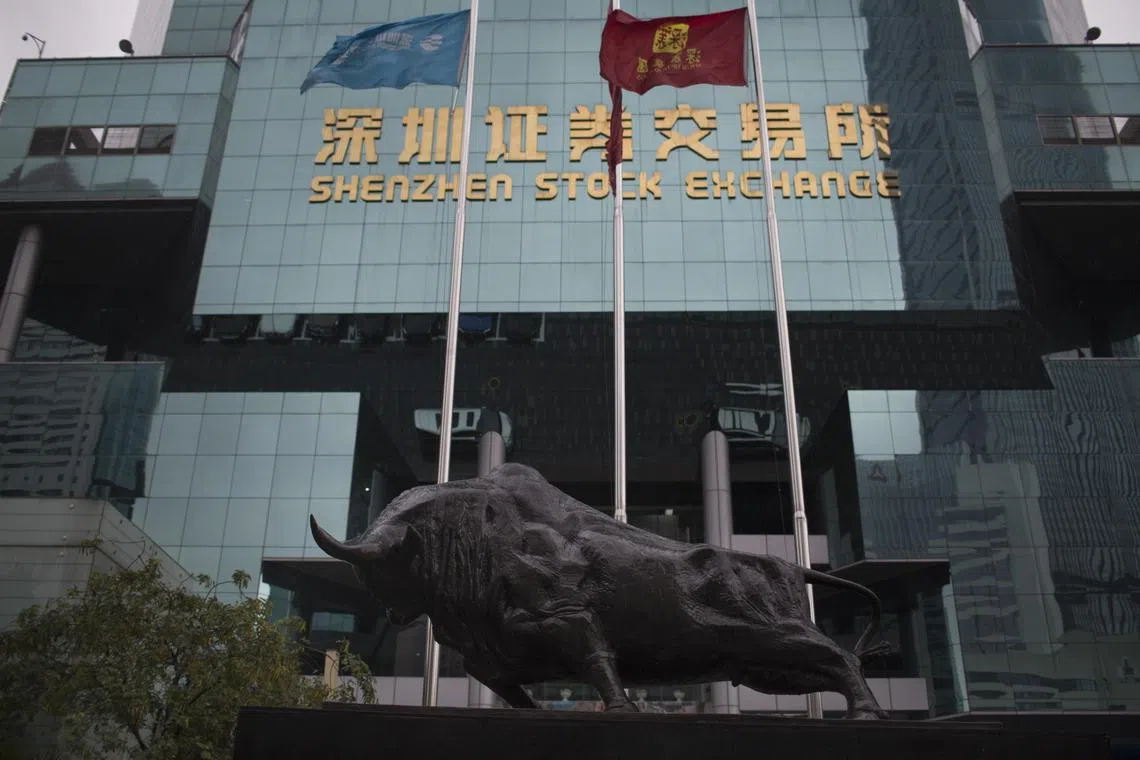News analysis
Trump makes Chinese stocks (somewhat) great again
Sign up now: Get ST's newsletters delivered to your inbox

Global investors are moving to Chinese stocks amid a US market rout, drawn by relatively low prices, AI bets and prospect of more stimulus from Beijing.
PHOTO: BLOOMBERG
SINGAPORE/HONG KONG – As US President Donald Trump’s wide-ranging trade war rouses fears of recession, global investors have found an unlikely new sanctuary: Chinese stocks.
Hong Kong’s benchmark Hang Seng Index – where many major Chinese companies are listed – is up 17 per cent since Mr Trump entered the White House in January.
That compares with an about 9 per cent drop in the S&P 500, which has also shed US$4 trillion (S$5.34 trillion) in market value from record highs in February.
Mr Trump’s erratic pronouncement on tariffs and moves to slash federal government spending have challenged assumptions about the appeal of US stocks, which have vastly outperformed most of their global counterparts since 2021.
Investors have moved from believing in “TINA” – There is No Alternative to US assets – to “TIARA” – There Is A Real Alternative – said Mr Andy Wong, a senior Hong Kong-based executive at Pictet Asset Management.
Much of the Chinese rally has been led by technology shares that have risen 29 per cent so far in 2025, hitting their highest level in more than three years last week.
A key reason for the optimism: Chinese stocks are cheap, trading 30 per cent under their 2021 highs. The Hang Seng Index is priced at seven times its projected 12-month earnings – a commonly used metric to value stocks – compared with 20 times for the S&P 500, according to LSEG data.
To be sure, Chinese equities traded cheaply for a reason. Many investors were burned after a pandemic-era government crackdown on tech stocks and questions remain over the property market and the economy. Concerns about the concentration of power in the White House are magnified in Beijing, where President Xi Jinping has no serious political opposition.
But investors see plenty of upside after a major rally in tech shares following artificial intelligence start-up DeepSeek’s splashy debut of its R1 reasoning model. The prospect of fiscal stimulus that could lift consumption – long a drag for the Chinese economy – is another tailwind.
While some of the renewed global interest in Chinese equities has come at the expense of US stocks, investors are also moving out of South Korea and India’s struggling markets, according to Reuters’ interviews with more than a dozen fund managers and strategists.
J.P. Morgan has seen a record amount of US dollars and Chinese yuan being converted into Hong Kong dollars over the past few weeks, pointing to the force of money flowing into Hong Kong stocks, said Ms Serene Chen, the firm’s head of credit, currency and emerging market sales. She did not specify the amount or the time period.
Mr Leo Gao at Greenwoods Asset Management said that he sold all the US companies in his portfolio in early February, shortly after the emergence of DeepSeek.
The senior portfolio manager at one of Asia’s largest hedge funds told investors in March that he was now especially bullish on China tech firms and other companies that cater to changing consumer habits.
US recession?
Mr Trump declined over the weekend to rule out the prospect of a recession for the world’s largest economy, exacerbating market fears. Investors have also reacted negatively to the volatility of decision-making in the White House, which had issued last-minute delays on tariffs on Canada and Mexico.
Slowing economic data is additionally raising doubts over whether US growth can outpace the rest of the rich world for much longer. US equities valuations are sky-high and susceptible to any hint of trouble.
Mr Trump has so far downplayed market turbulence and repeatedly said that “tariffs are going to make our country rich”. China, meanwhile, has been rolling out stimulus and support measures for its economy and markets. In February, Beijing held a meeting between Mr Xi and business leaders that investors widely took as a positive signal.
“China is now the adult in the room,” said Mr Dong Chen, chief Asia strategist at Pictet Wealth Management.
Foreign-based funds invested US$3.8 billion in Chinese equities in February, after three straight months of withdrawals, data from Morgan Stanley showed. Mr Kamal Bhatia, New York-based chief executive of Principal Asset Management, said long-term investors like predictability.
“Even very large sophisticated investors don’t want to have their investment thesis change over three years,” he said.
Some investors noted the irony of a rally in the equities markets of Europe and China, which Mr Trump has singled out as geopolitical rivals.
“The pressure that the Trump administration is putting on foreign governments... has actually, in a lot of cases, resulted in outperformance from those countries,” said Mr Ross Mayfield, a US-based investment strategist at Baird.
Structural or short-term?
Alongside concerns around China’s corporate reporting standards, the deflationary pressures and a renewed trade war with US weigh on sentiment.
Chinese stocks surged in September after Beijing unveiled stimulus measures but the rally quickly fizzled. “Still, people have traumatic experience with Chinese equities,” said Pictet’s Mr Chen. “China used to be called uninvestible and so this deflationary kind of narrative still hasn’t been completely dissipated.”
Mr Bhatia said his clients are asking more about tactical allocations, an investment strategy that aims to take advantage of trends and economic changes with short-term bets.
“The past ten days have made it very clear that it pays off to have a regionally diversified allocation strategy,” said Ms Lilian Haag, a senior portfolio manager at DWS. REUTERS


